The Intel Core i9-9900K at 95W: Fixing The Power for SFF
by Ian Cutress on November 29, 2018 8:00 AM ESTCPU Performance: Encoding Tests
With the rise of streaming, vlogs, and video content as a whole, encoding and transcoding tests are becoming ever more important. Not only are more home users and gamers needing to convert video files into something more manageable, for streaming or archival purposes, but the servers that manage the output also manage around data and log files with compression and decompression. Our encoding tasks are focused around these important scenarios, with input from the community for the best implementation of real-world testing.
All of our benchmark results can also be found in our benchmark engine, Bench.
Handbrake 1.1.0: Streaming and Archival Video Transcoding
A popular open source tool, Handbrake is the anything-to-anything video conversion software that a number of people use as a reference point. The danger is always on version numbers and optimization, for example the latest versions of the software can take advantage of AVX-512 and OpenCL to accelerate certain types of transcoding and algorithms. The version we use here is a pure CPU play, with common transcoding variations.
We have split Handbrake up into several tests, using a Logitech C920 1080p60 native webcam recording (essentially a streamer recording), and convert them into two types of streaming formats and one for archival. The output settings used are:
- 720p60 at 6000 kbps constant bit rate, fast setting, high profile
- 1080p60 at 3500 kbps constant bit rate, faster setting, main profile
- 1080p60 HEVC at 3500 kbps variable bit rate, fast setting, main profile
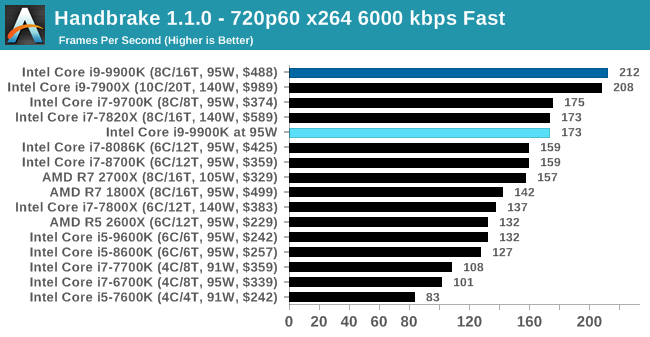
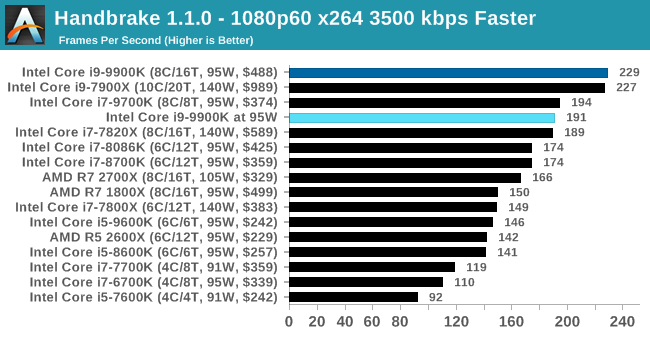
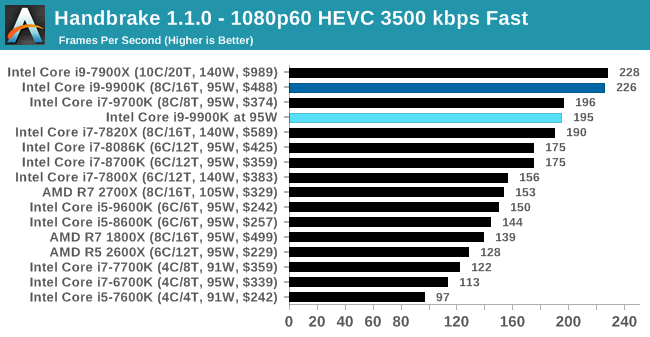
Encoding is a good example where the performance decreases by a noticable margin (10%+), although perhaps not as much as you might think. In all of our tests however, the 95W mode again pulls the 9900K down to the level of a 9700K. This pattern goes through all of our encoding tests.
7-zip v1805: Popular Open-Source Encoding Engine
Out of our compression/decompression tool tests, 7-zip is the most requested and comes with a built-in benchmark. For our test suite, we’ve pulled the latest version of the software and we run the benchmark from the command line, reporting the compression, decompression, and a combined score.
It is noted in this benchmark that the latest multi-die processors have very bi-modal performance between compression and decompression, performing well in one and badly in the other. There are also discussions around how the Windows Scheduler is implementing every thread. As we get more results, it will be interesting to see how this plays out.
Please note, if you plan to share out the Compression graph, please include the Decompression one. Otherwise you’re only presenting half a picture.
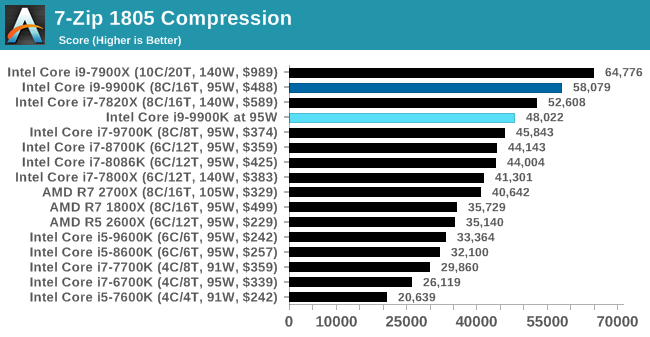
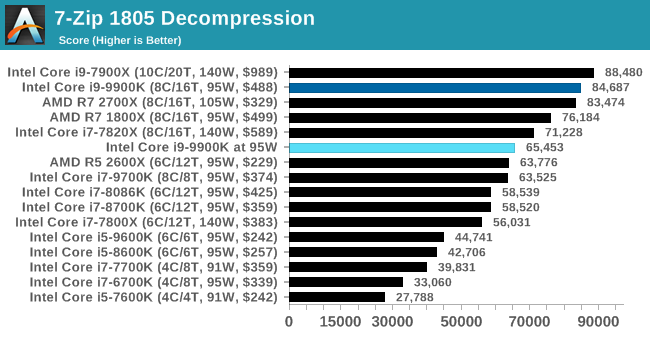
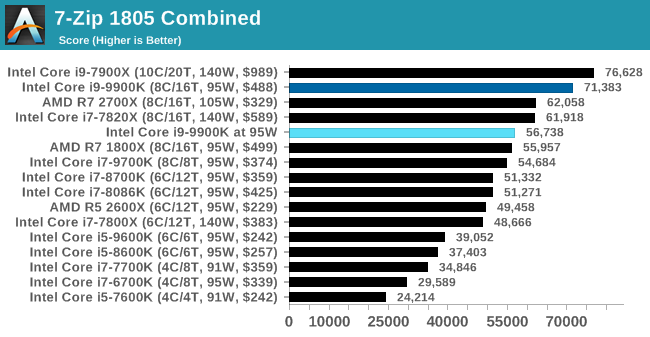
WinRAR 5.60b3: Archiving Tool
My compression tool of choice is often WinRAR, having been one of the first tools a number of my generation used over two decades ago. The interface has not changed much, although the integration with Windows right click commands is always a plus. It has no in-built test, so we run a compression over a set directory containing over thirty 60-second video files and 2000 small web-based files at a normal compression rate.
WinRAR is variable threaded but also susceptible to caching, so in our test we run it 10 times and take the average of the last five, leaving the test purely for raw CPU compute performance.
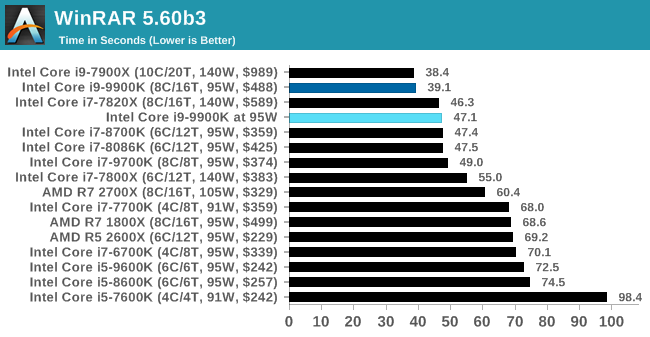
AES Encryption: File Security
A number of platforms, particularly mobile devices, are now offering encryption by default with file systems in order to protect the contents. Windows based devices have these options as well, often applied by BitLocker or third-party software. In our AES encryption test, we used the discontinued TrueCrypt for its built-in benchmark, which tests several encryption algorithms directly in memory.
The data we take for this test is the combined AES encrypt/decrypt performance, measured in gigabytes per second. The software does use AES commands for processors that offer hardware selection, however not AVX-512.
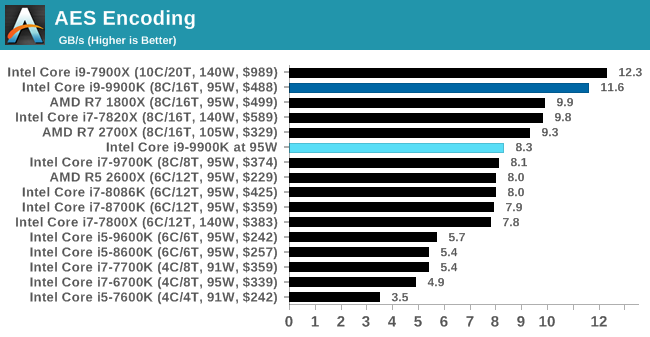










101 Comments
View All Comments
urbanman2004 - Thursday, November 29, 2018 - link
Yeah, the 9900K is the latest and greatest when it comes to mainstream CPU's, but at its current pricing you're better off purchasing a more value oriented CPU such as the 8700K to get more bang for your buck. Intel has been losing their sh!t as of late ever since AMD's Ryzen has them on their heels.AlyxSharkBite - Thursday, November 29, 2018 - link
The 9900K is awesome if you build a rig that can keep it cool when overclocked. But otherwise yeah an 8700K is a better choice or for bang for buck the 2700X is good4800z - Thursday, November 29, 2018 - link
It's not that hard to cool it. Just need a big noctua or an AIO.TheinsanegamerN - Thursday, November 29, 2018 - link
It still runs high 90C under OC on such coolers. The only way to keep it running at a 5 GHz OC with with a 360mm rad, and even then just barely.The 9900k is the hardest intel to cool since the pentium DEE
4800z - Thursday, November 29, 2018 - link
If you want value stop playing games and get a part time job so you can have more money in your pocket. The 9900k is only a few hundred dollars more. THat's not much spread over years.sa666666 - Thursday, November 29, 2018 - link
Found the Intel shill/apologist. Not everyone has unlimited funds to spend like that, and even if they could afford the CPU, what about the power to run it? This CPU is very power-hungry and expensive, and insulting users that don't have a lot of money (or have a better sense of how to properly budget it) won't change that fact.schujj07 - Thursday, November 29, 2018 - link
Very true. Has to justify the reason for spending an arm and a leg on his/her new space heater. 4800z while the CPU is $200 more expensive, you also need the $70+ cooler, you have to have the expensive z390 motherboard that adds another $70 onto the build, your room is going to be warmer so that will increase your cooling costs, and drawing 77% more power means you are going to increase your electric bill. All these costs add up and unless you are able to purchase this on a credit card with 0% interest or have saved up for a long time, the extra $400 is going to make a huge difference. Also someone could go with the 2700X or 8700K and use the extra $400 for a nice upgrade on their build, where said person would have gotten a RTX2080 not s/he can afford a RTX2080Ti.TEAMSWITCHER - Thursday, November 29, 2018 - link
He's not wrong. The 9900K is closer the Thread Ripper in many benchmarks than Ryzen is to the 9900K, and at the same time closer to Ryzen in cost. While billed as a gaming processor, the 9900K is great for content creators. Unless you have a specific need for HEDT platform capabilities (RAM or PCIe lanes) the 9900k would get the job done for less money.Targon - Thursday, November 29, 2018 - link
And if you just wait until March of 2019, Ryzen 3rd generation will probably meet or beat the performance of the 9900k for $330. So your $200+ higher price will only be for 4-5 months of having superior performance before the new AMD will be considered faster.HollyDOL - Saturday, December 1, 2018 - link
I know a person holding to a similar philosophy. He still runs Athlon XP, always waiting for the next generation beating the current one.